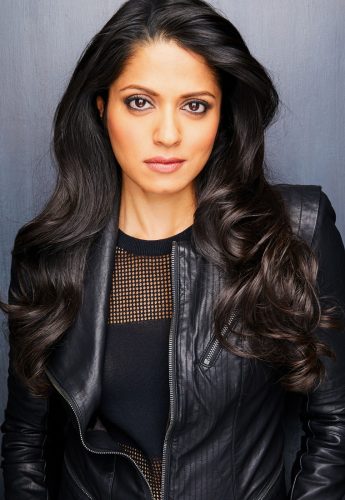Kerala, INDIA / U.S.A:

Mouzam Makkar is currently seen on high voltage legal drama “The Fix” on ABC.
Actor Mouzam Makkar, who plays Loni Kampoor on ABC’s ongoing series The Fix, has come a long way since she arrived in the US as an excited 12-year-old. Today, she along with many other South Asians in American entertainment industry, are not only defying brown stereotypes but are also introducing a newer idea of success in otherwise academically inclined South Asian American families.
While The Fix began airing last month, Makkar has been slowly establishing her identity as a talented Indian American actor. Last year, she was seen in Champions on NBC that was created by Mindy Kaling and Charlie Grandy. Before this, Makkar was also seen in The Following, Exorcist, Law & Order: SVU and many other shows.
“It’s a very exciting time to be a South Asian actor,” she says about being among the few brown actresses who may be changing the long-held stereotypes on American TV. “There are more of us doing TV and film than ever before and the types of roles we play continue to expand. There are also more South Asian content creators and that makes a big difference in expanding the types of narratives we get to tell. It’s been wonderful to be a part of a variety of stories where my characters were not solely defined by my ethnicity.”
Makkar, who hails from Kerala, India, spent a few years in the UAE before making America her home. She graduated with a bachelor’s degree in finance and worked in both investment banking and private equity before shifting to entertainment. Asked if it is doubly difficult for a person of color to find a foothold in the highly competitive Hollywood, Makkar says, “Hollywood is a very tough industry and being a person of color when the majority of the stories are still being told through a white lens makes it that much more difficult. However, things are changing and an important aspect of that change come from people behind the camera. Directors, producers and casting agents who are willing to think outside the box when they’re trying to fill a role make a difference in changing what’s on screen.”
Makkar also spoke about a growing number of South Asians in entertainment. “Those creating their own content can make some of the biggest difference in this industry and that’s exactly what the likes of Mindy Kaling, Aziz Ansari, Hasan Minhaj and Kumail Nanjiani have done with their projects,” She says. “When you write the story, you no longer have to play the supporting character – you can be the hero, the story can revolve around you and your experience. That what these folks have done with their TV shows and films – they’ve shown that the South Asian character and story no longer has to be an afterthought – they can be the main attraction.”
She spoke about the kinds of roles that she would want to see more on TV and in Hollywood. “As a Muslim artist, I would love to see a broader representation of Muslims in TV and film,” she says. “Muslims are an especially misunderstood group in this country and I truly believe that more nuanced and diverse portrayals of the Muslim diaspora can go a long way in helping the general public dismantle many of the negative stereotypes they may hold against Muslims. Given the recent attack in New Zealand, understanding and compassion is more important now than ever. The stories you see in TV and film can go a long way in humanizing people and experiences that you yourself might not directly encounter.”
On the artists that may have inspired her, Makkar says, “My dear friend, Fawzia Mirza, is an amazing filmmaker, actor and activist and she is absolutely an inspiration for creating and sharing stories boldly. As a queer storyteller, she brings yet another layer to the narrative and filmmakers like her are instrumental in showing the world that there isn’t just one type of Muslim or South Asian in this world. We are a varied and diverse group, dealing with unique and universal struggles and we can’t be neatly boxed into a single category.”
source: http://www.americanbazaaronline.com / The American Bazaar / Home> News> Entertainment / by Zofeen Maqsood / April 04th, 2019








